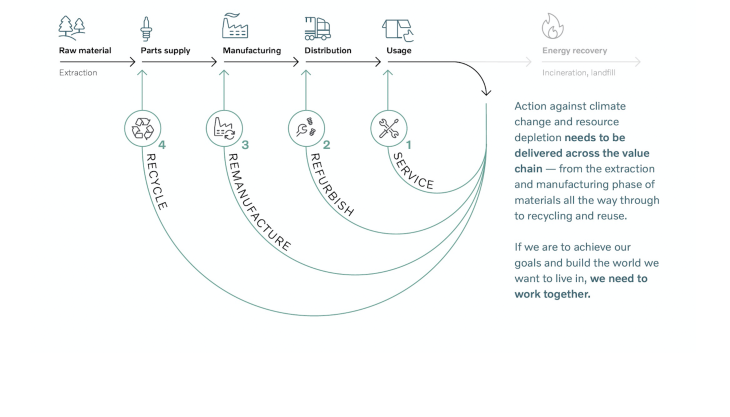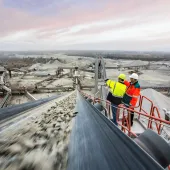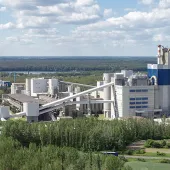The keys to a carbon-neutral future

Journey to a more sustainable construction industry not just about electromobility, say Volvo CE
THE journey towards a more sustainable construction industry is well under way with a clear roadmap ahead to deliver carbon-neutral equipment fit for the future. Battery electric and fuel-cell electric products form a major part of this ambition, but to reduce environmental impact and build the world people want to live in, there are many more factors to consider, say Volvo Construction Equipment (Volvo CE).
Volvo CE have a commitment to reach net-zero value chain greenhouse gas emissions by 2040. Developing battery electric vehicles and fuel-cell electric technology will go a long way to deliver on this ambition, but for a construction company today, there is much more to do to drive industry change. Here, Volvo CE look at some of the other significant actions that are required on the collective journey to a carbon-neutral future.
Get everyone on the carbon-reduction pathway
Combating climate change is not only about advancements in technology – perhaps the biggest hurdle ahead for humans lies in changing mindsets. ‘We all need to do this together, think differently and change our behaviours and ways of working,’ explained Niklas Nillroth, head of sustainability and public affairs at Volvo CE.
Once a niche responsibility area, carbon-reduction efforts now need to be the responsibility of everyone across an organization’s value chain, with all parties having an important role to play. At Volvo CE, an inclusive culture and shared ownership form a foundation to drive that change, with employees educated and encouraged to think about how their actions impact the carbon footprint, and how they can make a real difference, big or small. Empowerment like this will accelerate change.
‘Climate change is real and one of the greatest challenges of our time. As a world-leading manufacturer, we not only have a responsibility to reduce our carbon footprint, but we also have the clear vision, determination and talents to drive this transformation that is so urgently needed now,’ said Melker Jernberg, president of Volvo CE. ‘The choices we make today will form the world tomorrow – and we choose to act.’
Take action across the supply chain with a circular approach
Manufacturing is one of the largest single emitters of greenhouse gases in Europe, responsible for some 880 million tonnes of carbon dioxide equivalents (CO2e) a year. As part of their Science Based Targets goals, Volvo CE have set themselves the challenge to reduce CO2 emissions in their own operations by 50% by 2030. ‘We know that reducing our vehicles’ emissions through electric solutions is integral to our carbon-neutral ambitions, but we cannot forget the importance of our manufacturing processes,’ said Mr Jernberg.
A circular economy approach will be vital to shift from the linear ‘take, make, waste’ production and consumption model to a more sustainable value chain that designs out waste and pollution, bolsters competitive agility and drives new value. For example, as well as incorporating recycled components for parts supply and manufacturing, the Volvo Reman solution is focused on extending and optimizing the life of machines by refurbishing and refining them to deliver like-new service, the end-goal being to deliver a truly circular vehicle or machine that uses renewable energy efficiently, is built without waste, and has maximum uptime and an optimal lifespan.
Leverage the power of partnerships
Real transformation will require a more cohesive, co-operative way of thinking, as Brunno Muller, head of advanced manufacturing engineering and research at Volvo CE, explained: ‘We cannot build the future we want by ourselves. We need to consider how we do this end-to-end, joining forces with partners and sharing experiences.
‘Whether working with customers on test pilots to consistently improve the power of new technologies and products, through to collaborating with suppliers to source the best, most sustainable parts and processes, we need to partner with a range of groups from across our business and supply chain if we are to accelerate sustainable solutions.
‘All actors in society need to come together – corporations, academia, policy makers, and municipality leaders – to accelerate in important areas such as technology adaption, infrastructure and legislative transformation. With our combined expertise, we will be best placed to find new ways of working and to accelerate the changes needed for our carbon-neutral future.’
Use data to deliver on sustainability goals
According to a recent report by the World Economic Forum, most of the data in the world (90%) were generated in the last two years. Harnessing the full power of these data is the challenge. With more than 150,000 connected vehicles and machines, Volvo CE are using the data they collect from customers across the globe to deliver improvements in safety, uptime and fuel efficiency, for today and tomorrow. New digital services, such as Efficient Load Out, are making it possible for trucks and excavators to communicate more effectively with one another on the job site. By doing so, it ensures trucks only depart for their destination once a target weight has been reached, thereby reducing the number of trips and, in turn, reducing the associated emissions.
According to Volvo CE, the connected solutions they have made available today, and those that they are working on for tomorrow, allow their machines to operate in the most sustainable way possible. All these incremental improvements combine to deliver energy efficiencies across all types of machines, whether they are electric or not, and mark a vital step forward in the company’s ongoing journey towards a carbon-neutral future.









